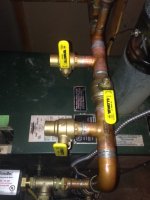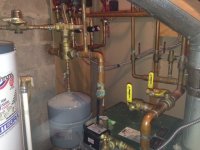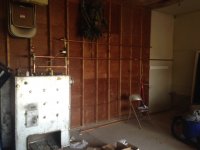Looking for some advice from those who have experience with water to water heat exchange plates.
I'm currently installing a coal boiler in my garage and will be plumbing it into the return of my propane boiler that is in the finished basement. I had a plumber working on that propane system recently installing zone pumps for my radiant floor heating. He installed a couple valves for me into the return pipe with a shut off bypass valve in the middle of the two so that I could install the coal boiler and he did it this way with the recommendation of attaching a water to water heat plate exchanger that the coal boiler would run into and keep the two units seperate using the coal hot water to heat the propane hot water keeping the gas from firing up.
As I'm running my copper from the coal boiler into the boiler room of the basement I'm second guessing the use of a heat exchange and why not simply run my supply and return into the valves he installed and skip the heat exchange? Are water to water heat exchanges efficient? To me it seems like it would take longer to heat the supply water in this way then to just run the already hot water from the coal boiler supply directly to my zone when they call for heat. If I do it this way the supply from the coal boiler would actually enter into the propane boiler return and fill the propane boiler first because of where the plumber installed the valves. This should prevent the propane from kicking on by keeping the water inside the propane boiler hotter than the aquastat temoerature without the need of the heat exchange plate right?
Now the length of the cooper run from the coal boiler to the propane boiler is about 40ft with about half of that being in the garage and the other half running through the drop ceiling in the basement. I thought that this may be the reason the plumber suggested the heat exchange because of the heat loss the copper would incur in that forty feet between the garage and zone manifolds. In the garage it will run along the wall and I plan on insulating the garage over time until it's completely finished.
This leads to another question...I had the idea of using a baseboard radiator along about 10-12ft of the coal boiler supply Running along the garage wall to help heat the garage as well. Will this cause too much heat loss in the supply line before it gets to the actual zone manifolds?
I appreciate any advice. Here's some pictures. - "boiler 1" shows the valves the plumber installed to connect the heat exchange plate for the coal boiler connection. "boiler 2" is more of an overall shot of the boiler and location of where those valves are. "coal boiler" is the install I'm doing with that running the copper along the wall that I will eventually finish with insulation and drywall, and where I thought I could put a radiator to get some heat into the garage.
I'm currently installing a coal boiler in my garage and will be plumbing it into the return of my propane boiler that is in the finished basement. I had a plumber working on that propane system recently installing zone pumps for my radiant floor heating. He installed a couple valves for me into the return pipe with a shut off bypass valve in the middle of the two so that I could install the coal boiler and he did it this way with the recommendation of attaching a water to water heat plate exchanger that the coal boiler would run into and keep the two units seperate using the coal hot water to heat the propane hot water keeping the gas from firing up.
As I'm running my copper from the coal boiler into the boiler room of the basement I'm second guessing the use of a heat exchange and why not simply run my supply and return into the valves he installed and skip the heat exchange? Are water to water heat exchanges efficient? To me it seems like it would take longer to heat the supply water in this way then to just run the already hot water from the coal boiler supply directly to my zone when they call for heat. If I do it this way the supply from the coal boiler would actually enter into the propane boiler return and fill the propane boiler first because of where the plumber installed the valves. This should prevent the propane from kicking on by keeping the water inside the propane boiler hotter than the aquastat temoerature without the need of the heat exchange plate right?
Now the length of the cooper run from the coal boiler to the propane boiler is about 40ft with about half of that being in the garage and the other half running through the drop ceiling in the basement. I thought that this may be the reason the plumber suggested the heat exchange because of the heat loss the copper would incur in that forty feet between the garage and zone manifolds. In the garage it will run along the wall and I plan on insulating the garage over time until it's completely finished.
This leads to another question...I had the idea of using a baseboard radiator along about 10-12ft of the coal boiler supply Running along the garage wall to help heat the garage as well. Will this cause too much heat loss in the supply line before it gets to the actual zone manifolds?
I appreciate any advice. Here's some pictures. - "boiler 1" shows the valves the plumber installed to connect the heat exchange plate for the coal boiler connection. "boiler 2" is more of an overall shot of the boiler and location of where those valves are. "coal boiler" is the install I'm doing with that running the copper along the wall that I will eventually finish with insulation and drywall, and where I thought I could put a radiator to get some heat into the garage.



